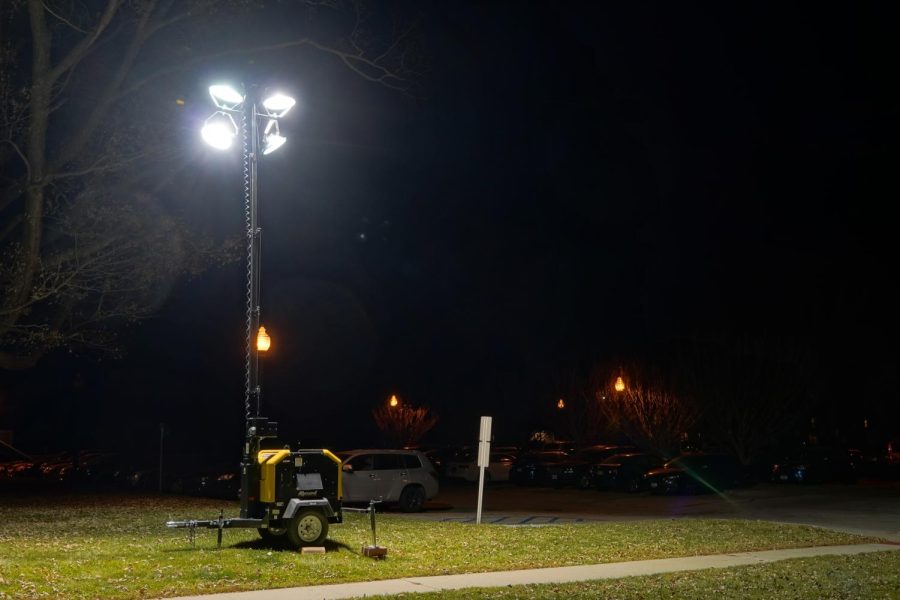College and city mobilize in response to racist attacks
Several floodlights were installed on campus, including on the corner of 10th Avenue and Park Street.
November 7, 2022
Following recent racist harassment and vandalism on campus, Grinnell College is offering a $2,000 cash reward for any information leading to charges being filed against those responsible, adding external on-campus lighting, installing outdoor cameras, expanding transportation services available to students, providing whistles and flashlights for students and employees and reaffirming the availability of support for Black students, students of color and any other affected students.
On Nov. 3, Anne Harris, the president of the College, announced in an all-campus email that the College is partnering with the city of Grinnell and the Poweshiek County Sheriff’s Office to offer a $2,000 reward. The reward is for any information leading to charges being filed against those responsible for harassing Black students and vandalizing on-campus property. There are currently two ongoing racist harassment investigations being conducted by the Grinnell Police Department.
“What’s going on is horrible and we here at the police department are doing everything we can to stop this from happening where we’re actively engaged with the College,” said Chief of Police Michael McClelland.
“Our job is to hold those that are doing it accountable,” McClelland said.
Additionally, the college is planning to install 10 cameras throughout 8th and 10th Avenue according to Vice President for student affairs Sarah Moschenross in an email to the S&B.
Moschenross wrote that the cameras will not be monitored. Should an incident occur, the camera footage will be checked to look at the details of the incident. She also said that the Division of Student Affairs (DSA) and the Student Government Association (SGA) are working together to develop an amnesty policy for students.
The details of the amnesty policy are not yet available as of Nov. 3, as the policy is currently under review and pending approval, according to Moschenross.
The College is also increasing its available transportation services for students so that the evening shuttles stop at the Conney M. Kimbo Black Cultural Center. The College is also providing after-hours safe rides by campus safety and the dean on-call, according to Heather Cox, director of emergency management and risk mitigation.
Cox also said the College is eliminating the $5 fee for shuttles to Iowa City and Des Moines.
Students and employees have whistles and flashlights available for pick-up at the Joe Rosenfield Center information desk or at campus safety in Mears Cottage. The College has also set up temporary lighting units where harassment has been reported on the corner of East Street and 8th Avenue and the corner of 10th Avenue and Park Street.
Assistant Vice President for facilities management Richard Whitney wrote in an email to the S&B that improving exterior lighting on campus is an ongoing effort and the task of the Outdoor Safety & Lighting Committee.
Moschenross said the Neighborhood Watch program was discontinued, as it was deemed unsustainable because it required 36 volunteers per night and the temperatures dropped. Instead, on-call staff in DSA will be patrolling campus, wrote Moschenross.
The College is also enacting long-term measures to address the issues, said Cox.
Cox wrote that the College is planning on offering bystander training for faculty, staff, students and community members. She wrote that the College would be “expanding access to Black counselors and Black-centered wellness options.” Cox also wrote that the College is assessing the most appropriate and effective self-defense training options for students.
The College is also working with community members to find solutions, wrote Vice President of Community Engagement and Strategic Planning Monica Chavez-Silva in an email to the S&B.
“President Harris invited several community leaders to join with College leadership for a conversation to raise awareness and begin seeking solutions,” she wrote.
According to Chavez-Silva, the group has now convened twice and included representatives from local government, the police department, the chamber of commerce, schools, Drake Community Library and local clergy. “Ideas so far are developing along the themes of solidarity, accountability and training,” she said.
Moschenross said that the harassed have been contacted by the Office of Diversity Equity and Inclusion and DSA and have been given the support they need in whatever form, such as access to counselors, chaplaincy services and academic advising.
There are different ways to report harassment on and off campus including the Poweshiek County Sherriff’s Department tip line at 641-623-5602, Campus Safety at 641-269-5602 or campussafety@grinnell.edu and the Bias Incident Reporting Team’s Bias Incident Report Form.


















































